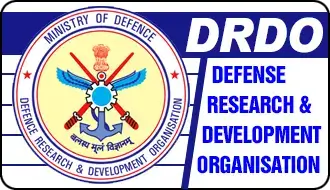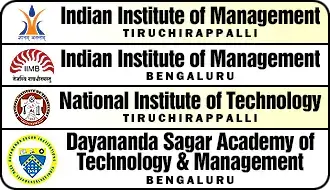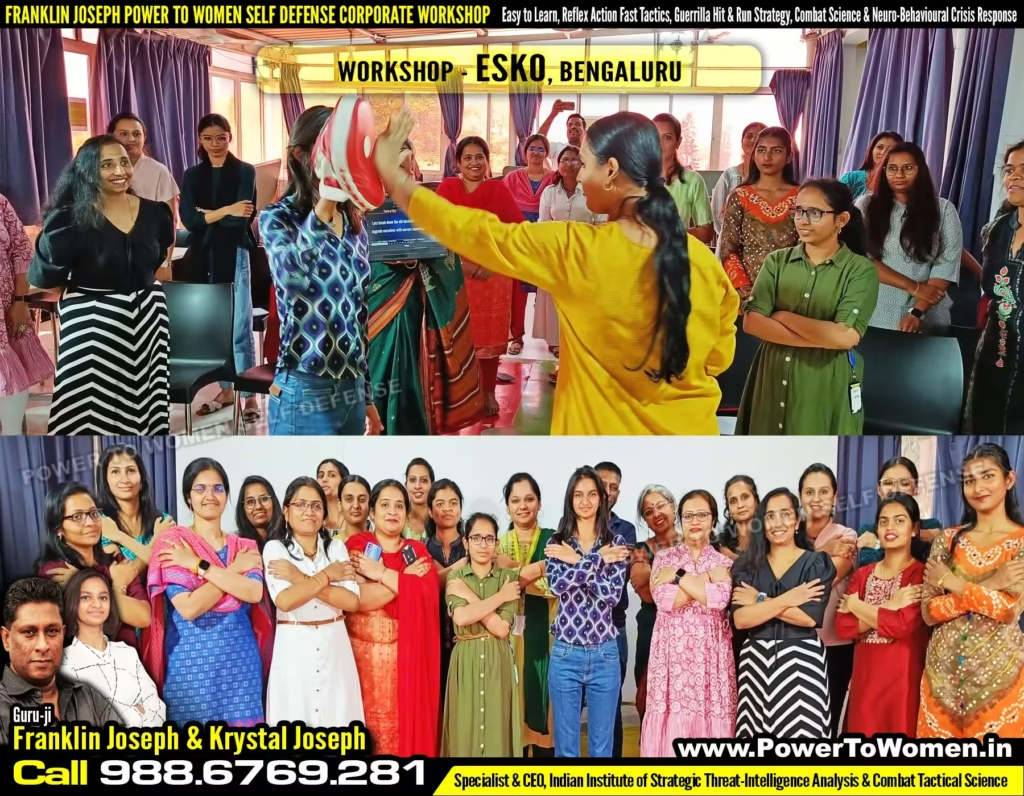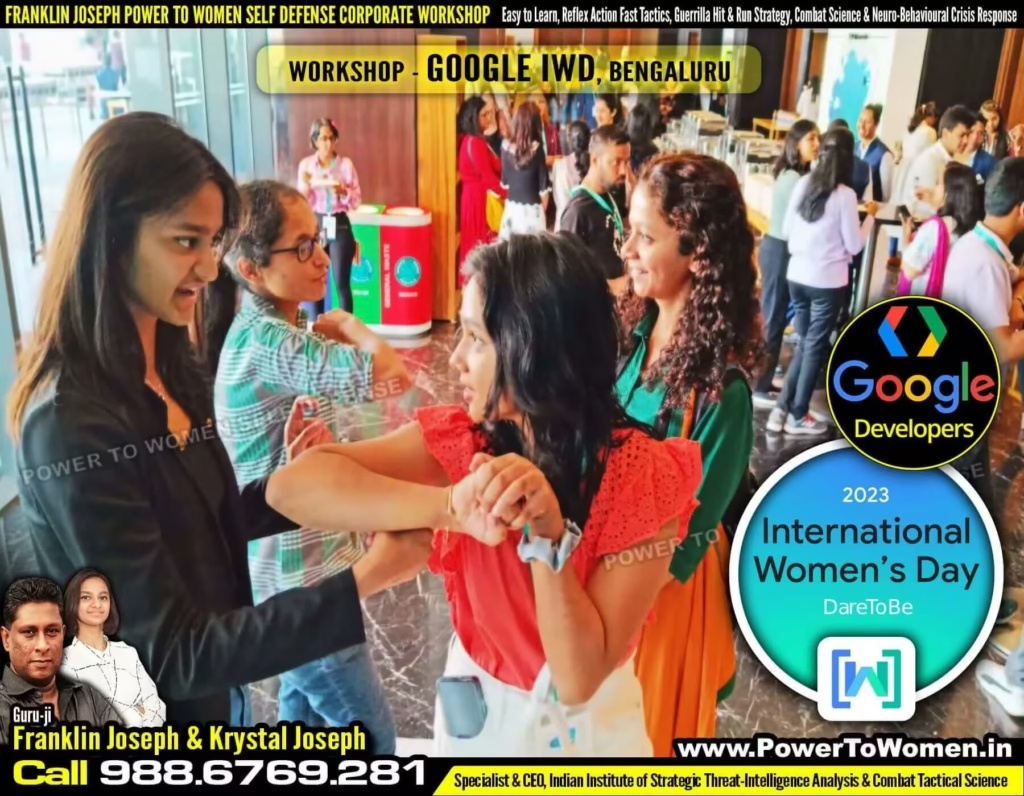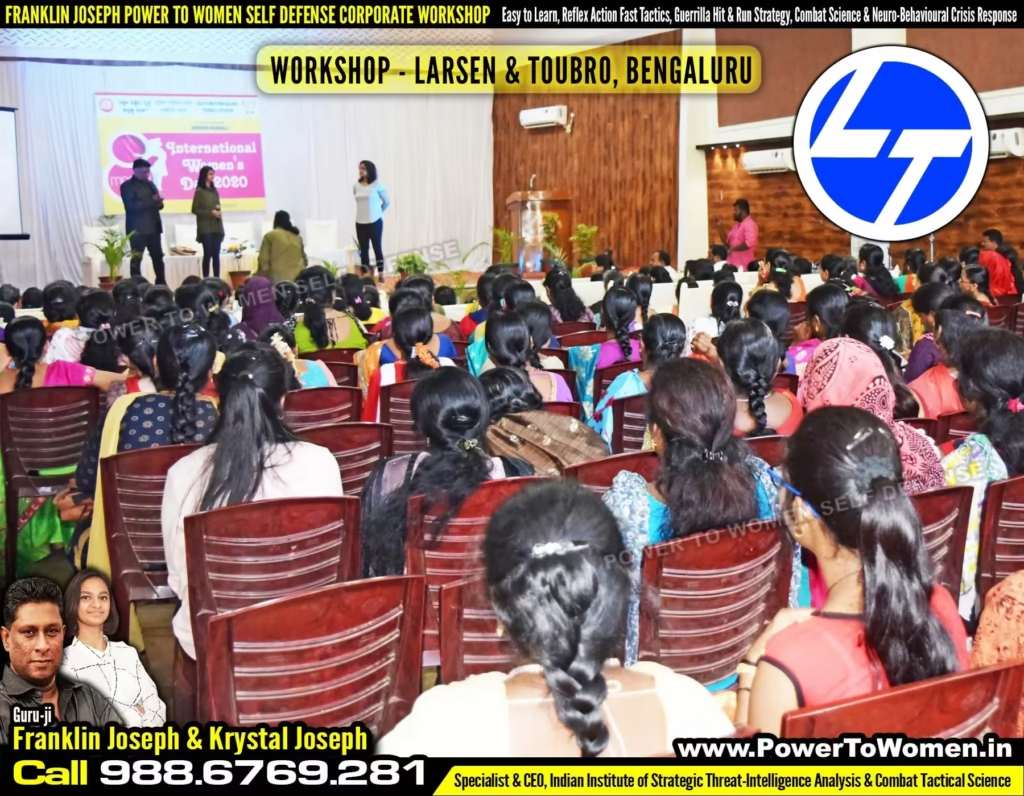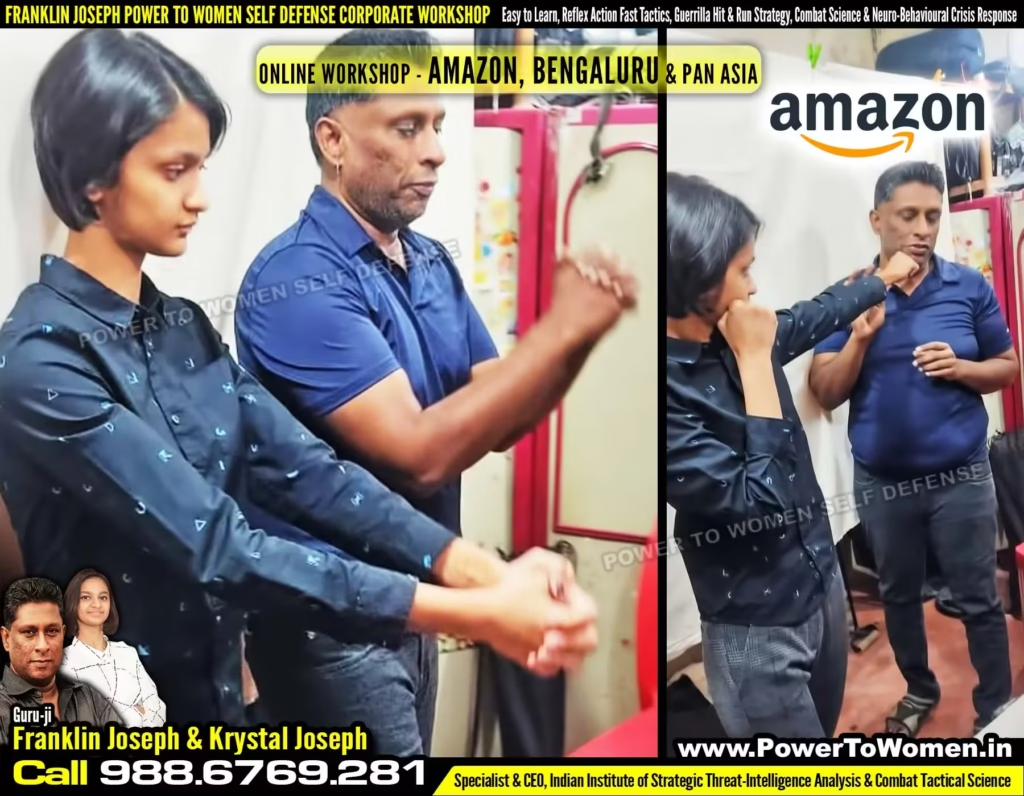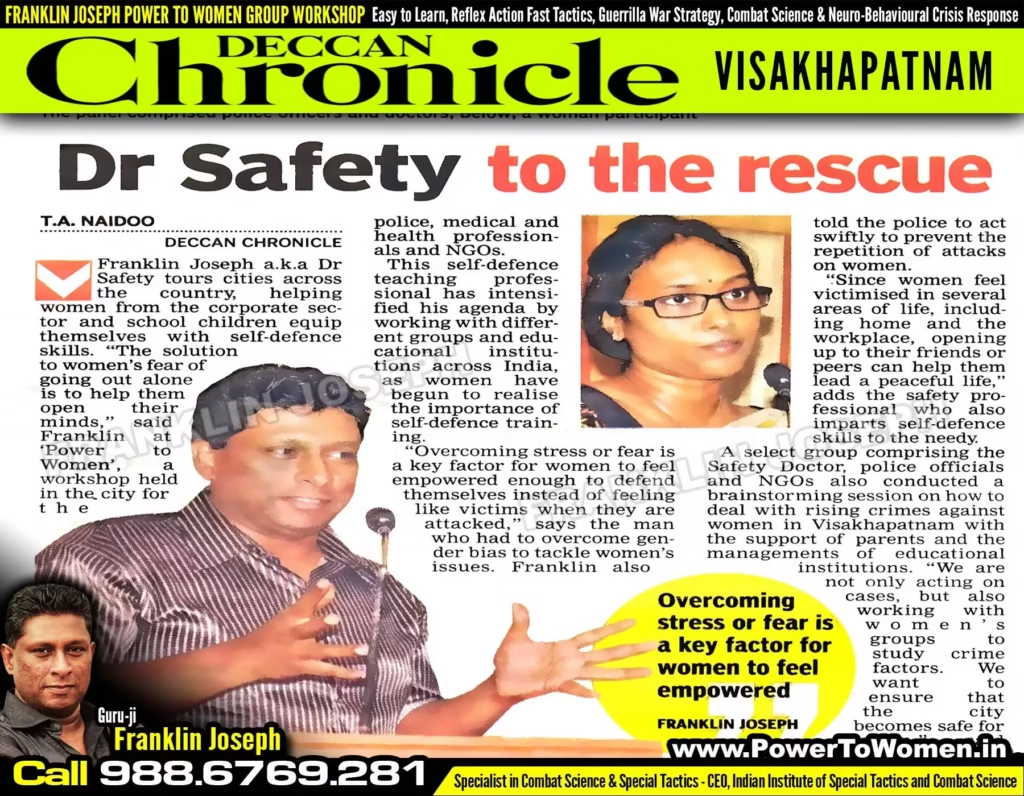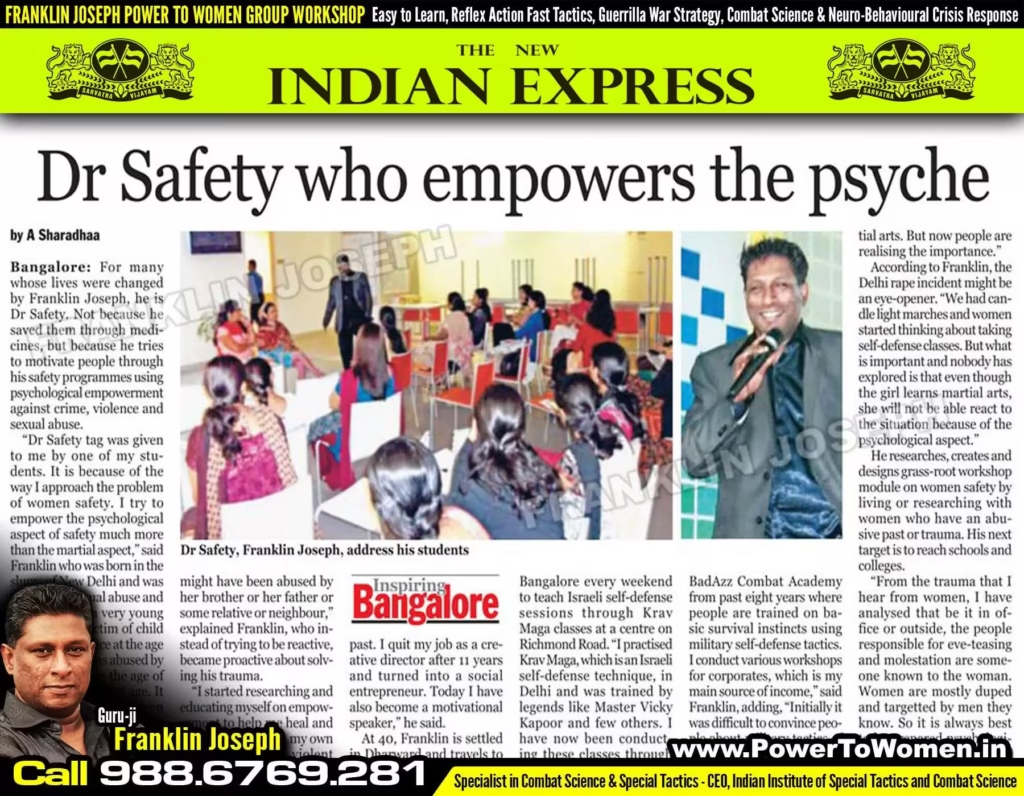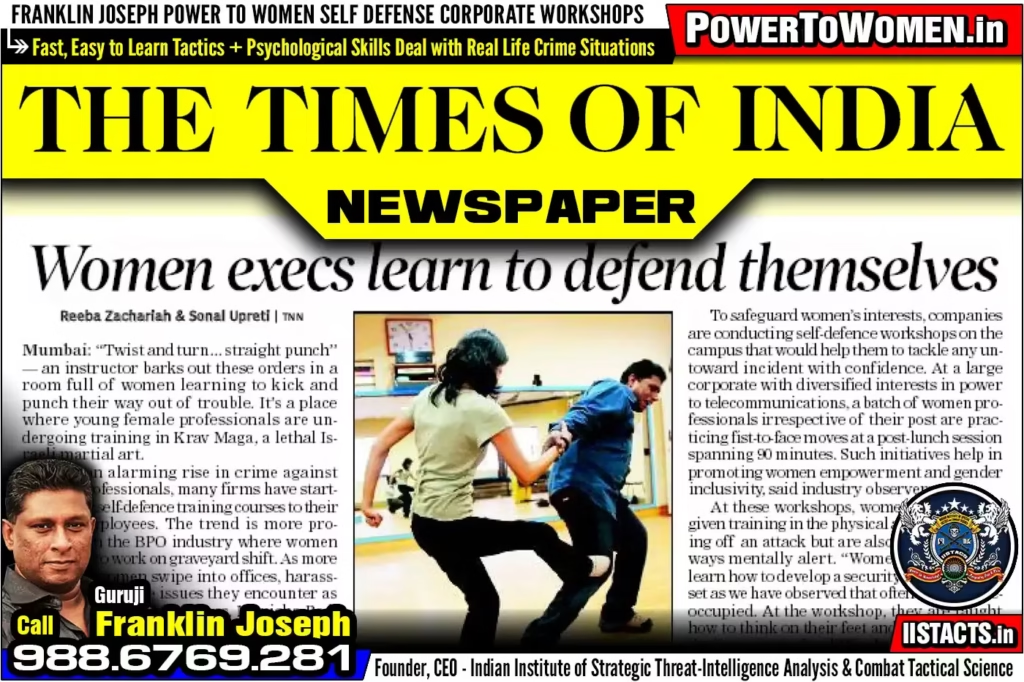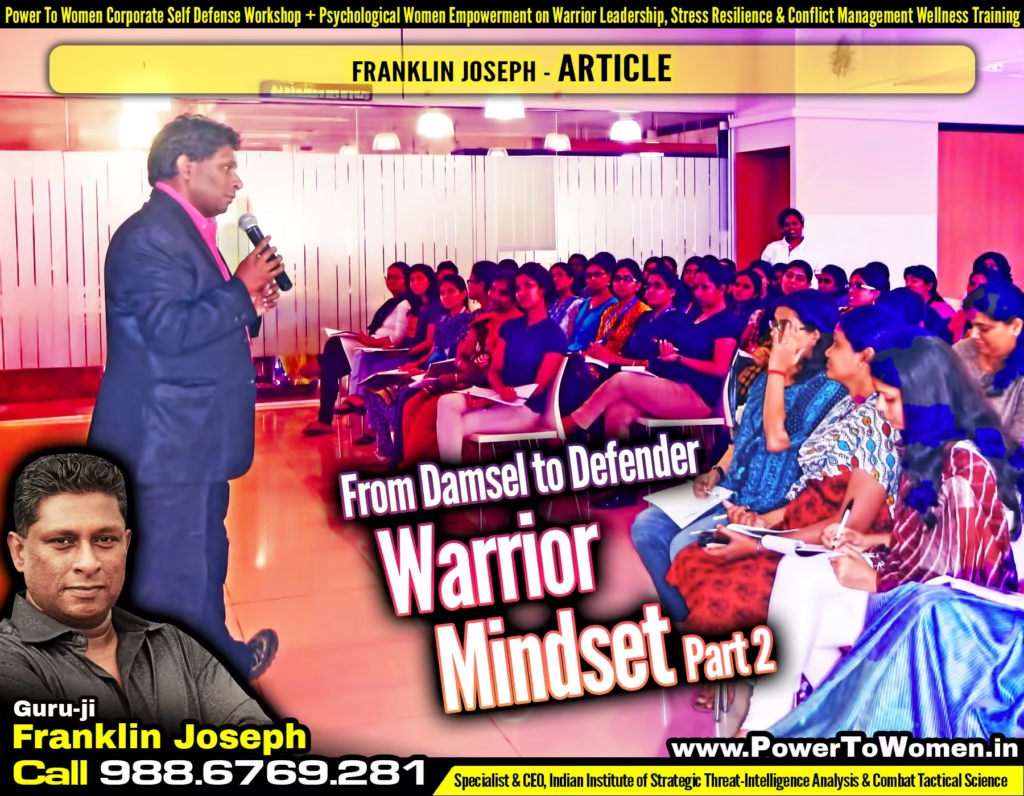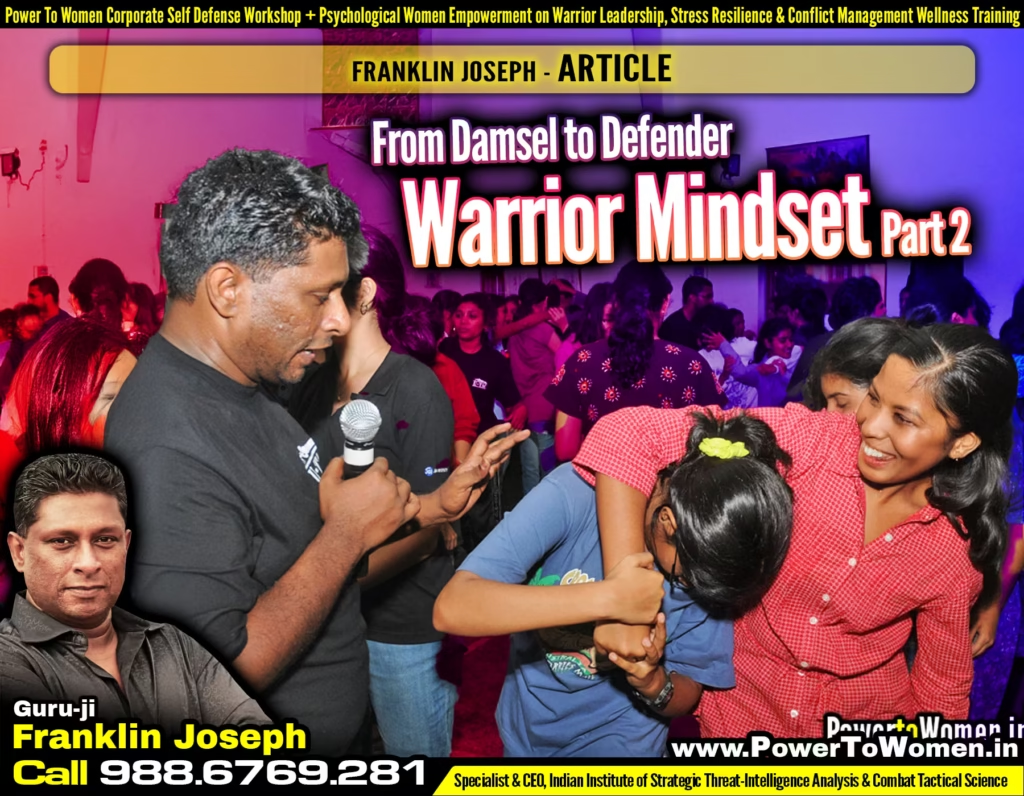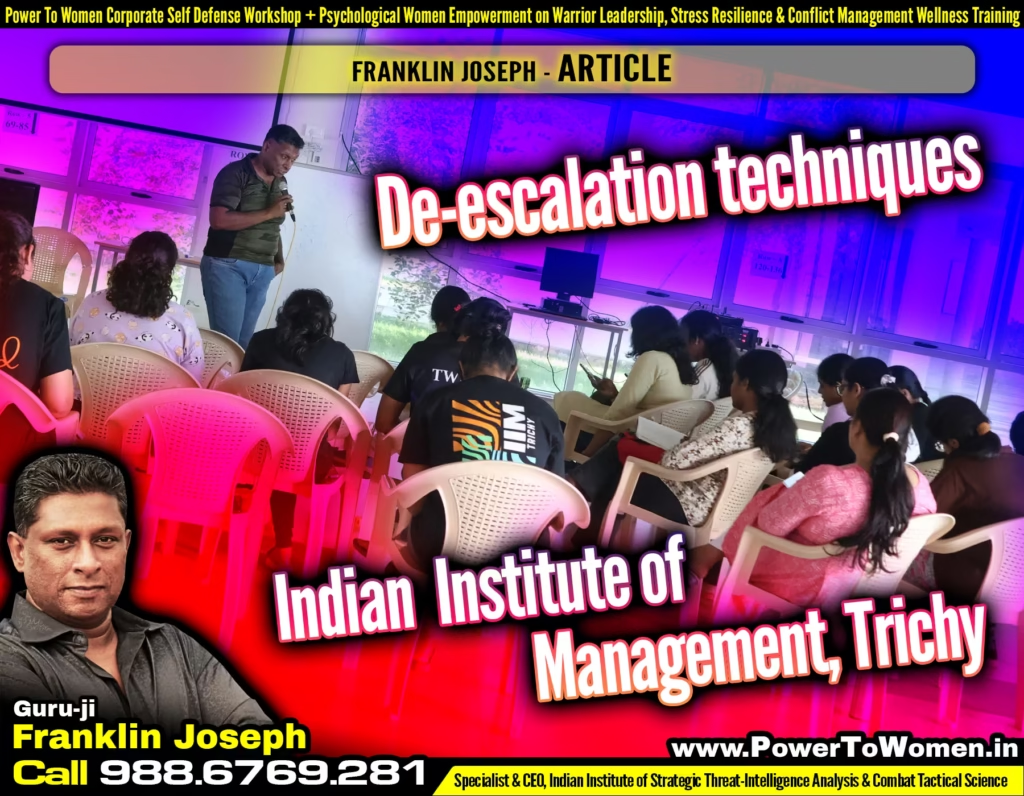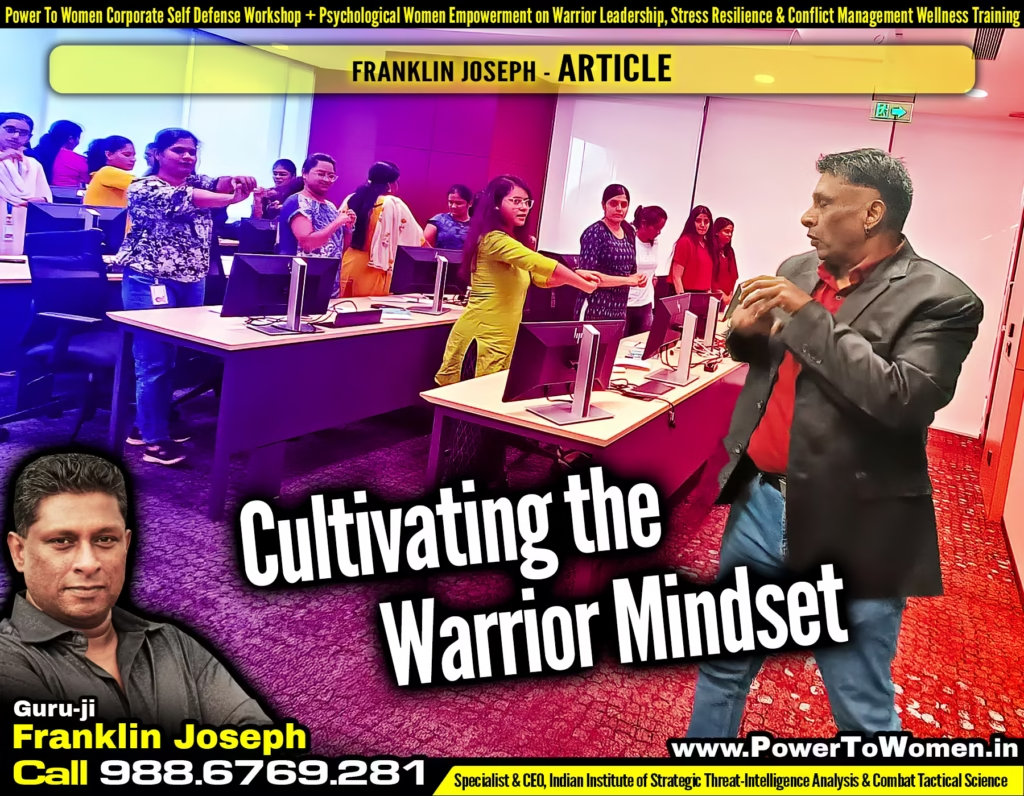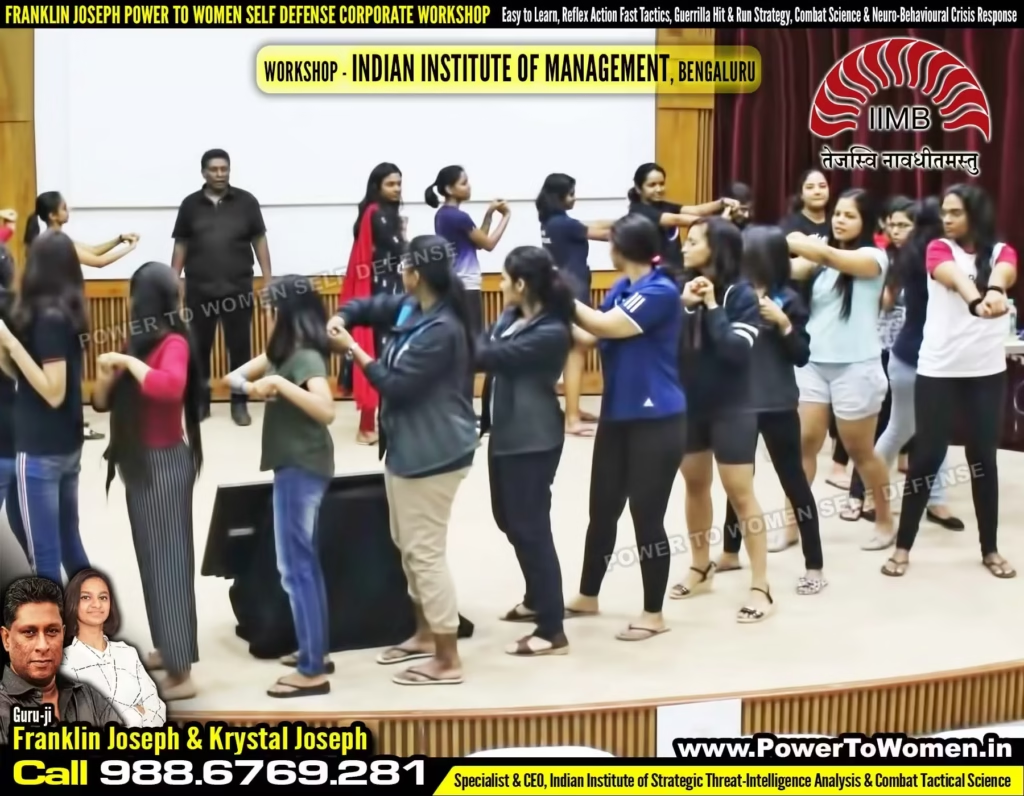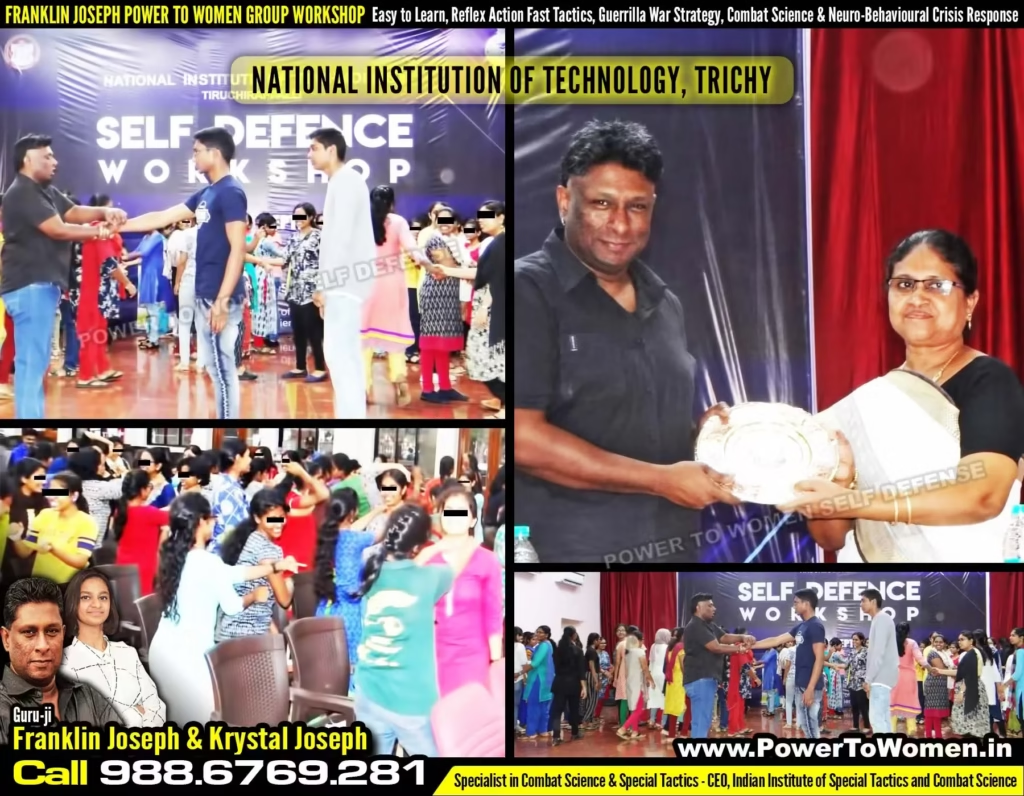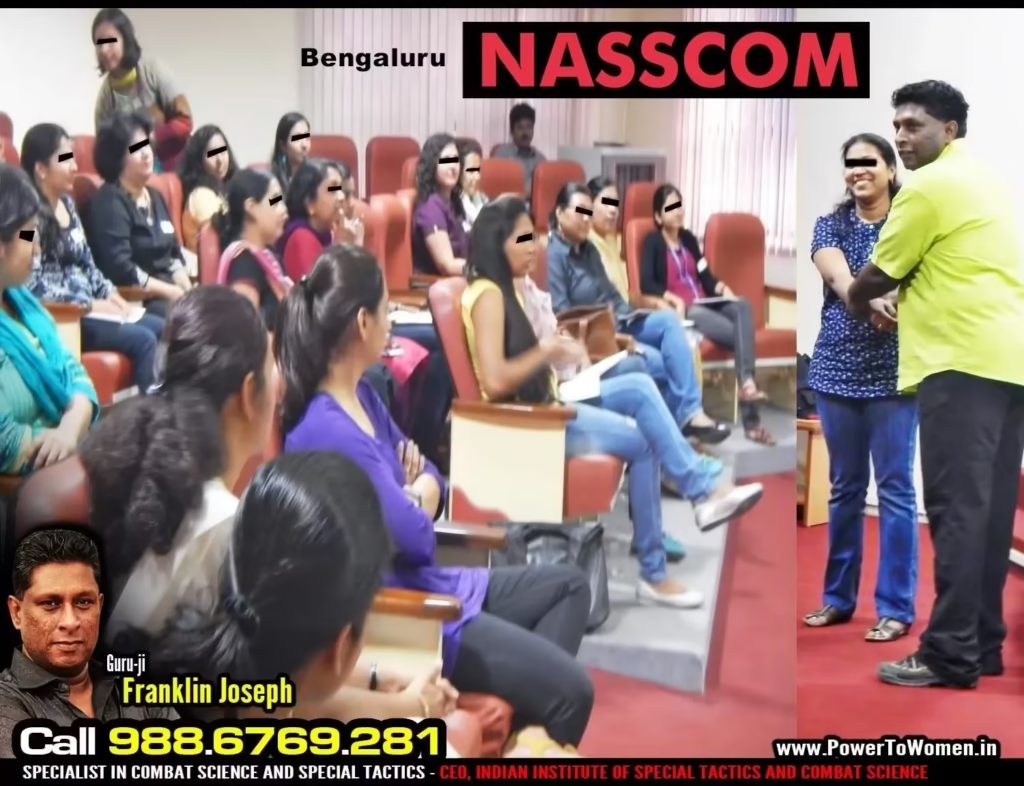Last updated on October 15th, 2025 at 07:14 am
Read Franklin Joseph Corporate Women Empowerment / Self Defense ArticlesCall 9886769281 for Corporate WorkshopsArticle written by Specialist Guruji Franklin Joseph
Guruji Franklin Joseph (alias ‘Dr. Safety’) holds the position of CEO at the Indian Institute of Strategic Threat Intelligence Analysis and Combat Tactical Science.
Safety Specialist Guruji Franklin Joseph is also a Social Entrepreneur, Founder of Franklin Joseph PowerToWomen.in ~ Corporate Krav Maga Self Defense Workshop with Psychological Leadership Empowerment, Stress Resilience & Crisis Management Training.
Women are breaking down restrictions and accomplishing amazing success in the fast-paced corporate world of today. But the road to the top isn’t always easy. Along with actual crimes that women in India experience on a daily basis, the difficulties that women encounter in the workplace such as sexual harassment, discrimination, and physical threats are a harsh reality. The Franklin Joseph PowerToWomen.in ~ Corporate Krav Maga Self Defense Workshop with Psychological Leadership Empowerment, Stress Resilience & Crisis Management Training helps women professionals become self-assured defenders instead of victims in need of protection.
Why Warrior Mindset in Corporate?
Social myths have frequently presented women as in need of protection throughout history. Although safety must always come first, things are changing. Women are developing a “warrior mindset” and embracing their inner strength more and more, which enables them to defend themselves and the people they love. This two-part article examines the main differences between the “female warrior” and “damsel in distress” mindsets and investigates the critical roles that corporate environments and educational institutions may play to encourage this empowering perspective.
In Franklin Joseph PowerToWomen.in ~ Corporate Krav Maga Self Defense Workshop with Psychological Leadership Empowerment, Stress Resilience & Crisis Management Training, the concept of the warrior mindset has become an essential foundation for both professional and personal development, especially for women navigating the corporate landscape. In the past, women in the workplace have frequently been viewed through a perspective that emphasises compliance, compassion, and passivity. These obsolete assumptions have the power to hide their potential and silence them during decision-making. But as corporations come to appreciate the importance of many points of view, it is critical to embrace an approach that enables women to overcome these obstacles.
Developing a strong sense of purpose, resilience, and confidence are all part of adopting a warrior mindset. This method focusses on empowerment by information, smart thinking, and assertiveness rather than embracing aggressive or hostile behaviours. Women can rethink their positions and make their contributions in their areas known by cultivating these characteristics. Corporate women who have an empowered perspective are better equipped to question the status of things, speak out for their beliefs, and overcome challenges.
Read Franklin Joseph Corporate Women Empowerment / Self Defense ArticlesCall 9886769281 for Corporate WorkshopsWomen’s psychological empowerment in corporate settings is significantly impacted by the change from traditional perspectives to a warrior attitude. Being able to overcome hurdles and take advantage of opportunities is crucial in today’s competitive environment. Women that possess a warrior mindset are more inclined to take chances, make decisions, and take on leadership roles, which promotes innovation and advancement in their organisations. In addition to having an impact on individual performance, this way of thinking can motivate and improve the overall experience of women in the workplace.
Given these circumstances, comprehending the warrior attitude becomes not just advantageous but also necessary. In the parts that follow, as we examine the elements of this mindset, we will look at feasible strategies that corporate women may use to develop resilience, assertiveness, and an unwavering sense of purpose in their work.
Damsel vs. Warrior: A Tale of Two Mindsets
Women are stereotyped as passive recipients of protection by the “damsel in distress” attitude, frequently depending on males or other outside forces to keep them safe. Feelings of fear, helplessness, and a weakened sense of independence might result from this way of thinking. Additionally, it may prevent women from seizing opportunities that may call for them to step outside of their comfort zones or take chances.
Conversely, the “female warrior” strategy encourages self-determination and empowerment. It sees strength as something that can be cultivated and obstacles as chances for personal development. This kind of thinking encourages women to take an active role in their own safety and gives them the self-assurance to handle challenging circumstances.
Key Characteristics of the Warrior Mindset:
Franklin Joseph PowerToWomen.in ~ Corporate Krav Maga Self Defense Workshop with Psychological Leadership Empowerment, Stress Resilience & Crisis Management Training primary focusses is on cultivating the characteristics of the Warrior Mindset via both psychological and tactical training.
The following are also included :
- Self-awareness ~
Read Franklin Joseph Corporate Women Empowerment / Self Defense ArticlesCall 9886769281 for Corporate Workshops
Being aware of your triggers, limitations, and strengths is essential to taking preventative measures for your safety. This includes not only bodily awareness but also emotional intelligence, which is the ability to identify your own emotional reactions to circumstances and create constructive coping strategies.
- Confidence ~
Making a decision requires having faith in your own abilities to overcome obstacles. Experience, self-belief, and a good self-image are the foundations of confidence. By offering chances for skill development and acknowledging accomplishments, educational institutions and corporate training initiatives can support the development of confidence.
- Resilience ~
One of the characteristics of a warrior mindset is the capacity to overcome obstacles and setbacks. Resilient women see difficulties as chances for personal development rather than insurmountable barriers. They get stronger as a result of challenging events, acquire useful coping skills, and learn from their errors.
- Resourcefulness ~
Navigating challenging situations is much easier when you are aware of prospective resources and know how to use them successfully. This entails locating others who can offer assistance, making prudent use of the resources and technologies at hand, and applying creativity to solve problems.
- Proactive ~
A proactive approach to safety is demonstrated by taking charge and making plans for possible threats. This entails cultivating situational awareness, recognising possible hazards in your surroundings, and creating plans for averting or defusing dangerous circumstances. Proactive people have a strategy for protecting themselves or getting assistance, and they are ready to act if needed.
- Assertiveness ~
The capacity to communicate oneself with assurance and respect is known as assertiveness. It entails establishing boundaries, standing up for oneself, and voicing one’s demands and opinions. Women who are assertive don’t hesitate to speak up, negotiate skilfully, or take the initiative in their work.
- Strategic Thinking ~
Read Franklin Joseph Corporate Women Empowerment / Self Defense ArticlesCall 9886769281 for Corporate Workshops
Analysing circumstances, recognising possibilities, and creating workable plans to accomplish objectives are all part of strategic thinking. It calls for the capacity for critical thought, problem-solving, and situational adaptation. Strategic women take a proactive stance at work, establishing specific goals and acting swiftly to reach them.
- Emotional Intelligence ~
Emotional intelligence refers to the ability to comprehend and control one’s own emotions, as well as the emotions of others. It entails cultivating self-awareness, empathy, and effective communication abilities. Women with emotional intelligence can inspire others, settle disputes diplomatically, and establish close bonds with coworkers.
- Continuous Learning ~
Adopting a lifelong learning mindset is crucial to staying ahead in the ever-changing corporate world. Seeking out new information and abilities, attending conferences, and keeping up with industry trends are all part of continuous learning. Women can improve their skills and maintain their competitiveness in job opportunities by making investments in their own personal growth.
The Role of Education in Fostering the Warrior Mindset
Franklin Joseph PowerToWomen.in ~ Corporate Krav Maga Self Defense Workshop with Psychological Leadership Empowerment, Stress Resilience & Crisis Management Training has a sister workshop called Franklin Joseph iTeachiPower.in ~ ‘Girls Educate, Lead, Mentor, Empower Girls’ ~ 3-Day School College Girls Empowerment Workshop on Krav Maga Self Defence, Critical Decisions, Conflict Leadership & Combat Science for Educational Institutions & CSR Partners.
The following are some ways that schools and universities can help young women develop a warrior mindset:
- Integrating Self-Defense Training ~
Go beyond only imparting physical skills. Include instruction in self-defence in a more comprehensive curriculum that covers situational awareness, de-escalation techniques, and the legal implications of self-defense. This all-encompassing method gives pupils the ability to make wise choices and respond appropriately in potentially hazardous circumstances.
- Inspiration from History ~
Read Franklin Joseph Corporate Women Empowerment / Self Defense ArticlesCall 9886769281 for Corporate Workshops
In history textbooks and other course materials, question the conventional narratives that uphold the damsel concept. Emphasise the tales of powerful women throughout history, including activists, scientists, soldiers, and businesswomen. Teachers can encourage pupils to perceive themselves as strong and effective agents of transformation by presenting these varied role models.
- Empowerment Workshops ~
Conduct Franklin Joseph iTeachiPower.in ~ ‘Girls Educate, Lead, Mentor, Empower Girls’ ~ 3-Day School College Girls Empowerment Workshop on Krav Maga Self Defence, Critical Decisions, Conflict Leadership & Combat Science for Educational Institutions & CSR Partners that highlights cultivating a variety of abilities that support the warrior mentality. Self-assurance, assertiveness, critical thinking, taking calculated risks, and bystander intervention are some of the subjects that may be covered in these courses. By giving kids these resources, teachers can enable them to overcome obstacles, stand up for themselves, and improve their communities.
- Shifting Language ~
Avoid using words that reinforce victimisation or helplessness. Use empowering language that highlights individual agency and problem-solving skills instead. For instance, rather than telling young people, “Don’t walk alone at night,” encourage them to plan safe routes and cultivate situational awareness. This change in terminology promotes a sense of independence and control by redefining safety as a skill that can be learnt.
- Mentorship Programs ~
Assign students to mentors who can provide them with motivation and direction while illustrating how to face obstacles in both personal and professional domains with determination and resolve. As students gain confidence and learn to deal with the challenges of life, mentoring programs can serve as invaluable role models, offering direction, encouragement, and support.
Corporate Workshops ~ 'Embrace Inner Power'
Our all-encompassing strategy combines state-of-the-art Israeli Military Krav Maga self-defence methods with revolutionary psychological tactics like to help you maintain composure, assertiveness, and control whether you're negotiating a high-pressure boardroom or an unpredictable street or domestic encounter. Don't hesitate; give Specialist Franklin Joseph a call @ 9886769281 right now to learn the most important skills and become a part of the movement towards empowered life.
Connect with Specialist Guruji Franklin Joseph for

